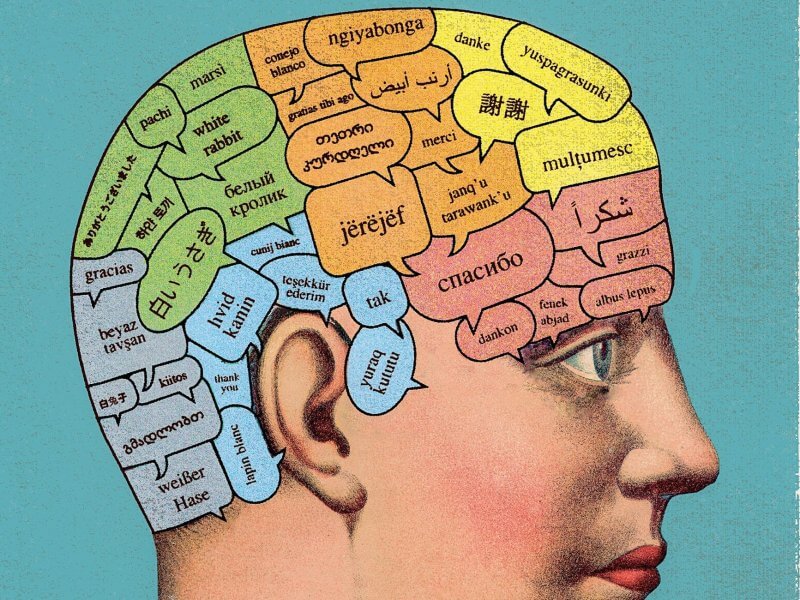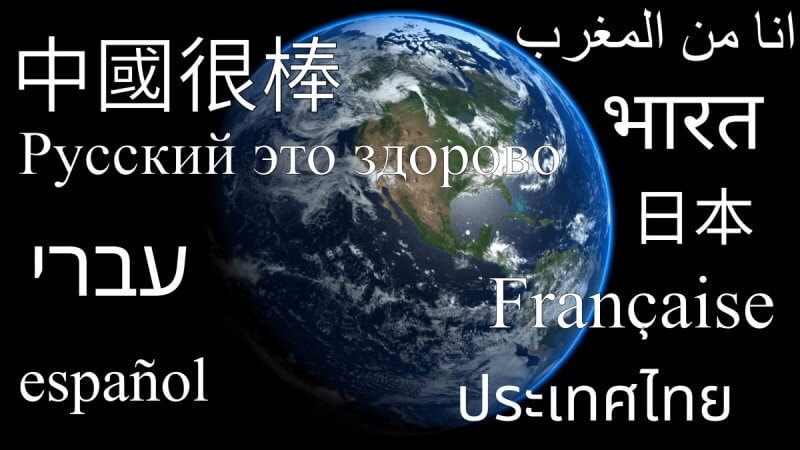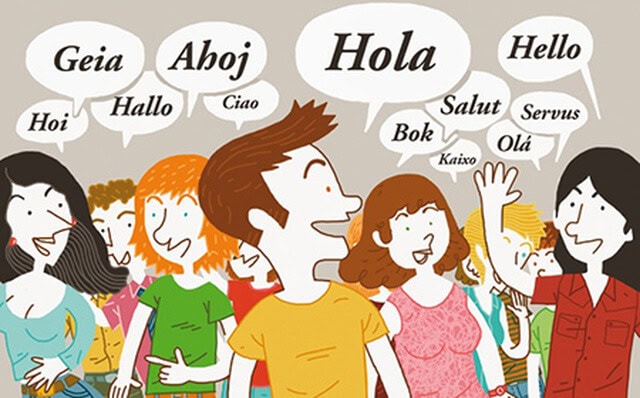You will be impressed when you meet someone who can speak two or more different languages in the world. Idichthuat gave some definitions of people who are fluent in several languages as follows:
- Monolinguals speak only one language, accounting for 40% of the world's population.
- Bilinguals speak two languages with almost equal fluency. About 43% of the world's population is bilingual.
- When a person is trilingual, it means he or she is fluent in three languages, who make up 13% of the global population.
- A person who can speak four or more languages is multilingual. Only 3% of people around the world can speak more than four languages.
- Less than 1% of people worldwide are fluent in multiple languages. If someone is fluent in more than five languages, that person is called a polyglot.
If you meet someone with a high level of proficiency in more than 12 languages, you have met a rare type of person – a “hyperpolyglot”.
The term was coined by an emeritus professor of linguistics at University College London by the name of Richard Hudson.

Note: 10 Things You Probably Didn't Know About French
Hyperpolyglot in the World
Cardinal Giuseppe Mezzofanti is one of the world's most popular hyperpolyglots. He was born in Bologna, Italy on September 19, 9. He could speak 1774 languages, although some claim that he spoke almost a hundred different languages.
Here are some of the most prominent hyperpolyglots today:
- Alexander Arguelles, an American linguist who speaks 12 languages.
- Jeong Su-il, a historian from Korea, speaks 12 languages.
- Lokesh Chandra, an Indian Buddhist scholar who can speak 16 languages.
- Péter Frankl, Hungarian mathematician, educator, commentator, and street artist, who speaks 12 languages.
- Swami Rambhadracharya of India, a Sanskrit scholar and Hindu leader who can speak 22 languages.
- Dilip Kumar, an Indian actor who can speak 12 languages.
- Ioannis Ikonomou, a Greek translator for the European Commission, can speak 32 languages.
- Richard Simcott is fluent in 16 languages. He lives in Chester, United Kingdom. He can learn a new language in a short time.
- Fernando de Castro speaks 16 languages. He was an interpreter, translator, and philosopher.
- Israel-born Ghil'ad Zuckermann was born in Israel is a hyperpolyglot, linguist and revivalist currently residing in Australia. He is a professor of linguistics and the Chair of Endangered Languages at the University of Adelaide.
- TRIVIA: Ziad Youssef Fasah of Liberia claims that he can speak 59 languages fluently. He was listed in the Guinness Book of Records until 1998. In 1997, on the Chilean TV show 'Viva el Lunes', he was asked by special guests to speak Greek, Hindi, Persian. , China, Russia, Finland and Egypt. He could only answer the first question. In 2015, he announced that he could convert code in 15 languages without preparation.
Is It Possible To Learn Several Different Languages?
It is difficult to give a definite answer to this question. Several different factors and schools of thought give rise to different reasons. Some people learn languages by reading. Others learn through movies, radio or television, while some can learn a language through face-to-face contact and conversation with native speakers.
Finding the World's Most Extraordinary Language Learner (2012) is a book by Michael Erard. He is an American journalist and non-fiction writer. In this book, Erard proposes that disciplined learning and good genes are the keys to a person's ability to learn languages.
This book raises other questions, such as whether the ability to be multilingual is innate or whether the ability to learn as many languages as possible can be achieved over time.
Note: Difference Between Language Localization and Translation
How Does the Brain Learn a New Language?
The brain of Emil Krebs, a German diplomat, was examined by scientists in 2004. Krebs studied and spoke 65 languages. Scientists wanted to know if the unique formation of his brain could be related to his skill with languages.
Broca's area is the part of the brain responsible for language. And, there are actually some unique features in the Broca area of the Krebs brain. However, scientists cannot tell if they are born or accumulated.
In 2012, researchers at Lund University Sweden conducted a study, where a group of students took other courses against language students. They all went through an intensive course in a foreign language. The brains of all participants were scanned after they completed the course. The researchers found that the Broca area of language students expanded while those belonging to students studying other subjects remained the same.
Note: 6 Most Difficult Languages In The World
How Many Languages Can You Learn In Life?
There is no definite answer to this question, because the reason why people learn languages is different. They learn out of necessity, convenience or because they love the language. Furthermore, some languages are closely related, so learning one language helps in the study of others. An example is the Romance languages. Other languages can be worlds apart, such as English and Chinese.
Also it's a matter of proficiency. One can claim to have learned many languages. The question then is how many languages a person can speak fluently. Some people speak in multiple languages, so they can have short conversations. However, their range of knowledge may not be as deep as that of native speakers or people who have studied the language for a long time.
Note: The Relationship Between Translation And Culture
Mastery of a language is often at different levels. You are fluent when you can confidently arrange a complex conversation with just a few mistakes and hesitations. On the Common European Framework of Reference for Languages (CEFR/CEFRL) scale, it is at level B. CEFR has a total of 6 levels:
Level A
- A1 – Beginners
- A2 – Basic
Level FUCK
- B1 – Intermediate
- B2 – Above Intermediate
Level C
- C1 – Advanced
- C2 – Proficient
A person can learn many languages in a lifetime but speaking them with proficiency and fluency is another matter. Achieving fluency in three or five languages is already a feat.
While researching his book, Michael Erard traveled the world and met several polyglot people. Adam Cansdale, a professional translator working at the European Commission in Brussels, speaks 14 languages. He also met Johan Vandewalle, a civil engineer and philosopher who spoke 22 languages.
Erard's survey of several modern hyperpolyglots shows that motivation, practice, and memory are important to them. Likewise, they are pragmatic. Erard shared that the hyperpolyglots he surveyed said they could speak 11 languages that don't care about sounds like native speakers. What excites them more is traveling, not getting lost in another country, and the joy of reading a newspaper in a foreign language.
Note: Professional Travel Document Translation
Immersion is the Key to Success in Language Learning
Learning and speaking different languages is a matter of personal choice, so think about what you will do with the languages once you learn them. Some people who are learning other languages believe that learning more than five is too much for the average person.
For Alex Rawlings, the most multilingual student in the UK:
“Language is an asset to whatever you want to do in life. They open your mind to worlds you never knew existed. They introduce you to amazing people you may have just passed.”
In 2012, Rawlings entered a contest for multilingual students. His fluency in 11 languages was tested and he won. After graduating from Oxford University, he began touring Europe and learning more languages. He is also a language teacher and organizes or participates in polyglot meetings. He attributes his success in language to linguistic and cultural immersion, which allows him to assimilate and retain what he has learned. He said that when you learn a language in school, you are not learning it, but you are being taught the language. At the end of the course, you may pass or fail, and you will likely forget the language quickly.
Another hyperpolyglot that believes immersion is the key to maintaining language is Richard Simcott. I said:
“The language carries the culture of the country that uses it and as you absorb it, it becomes a part of you too.”
Simcott was fascinated with languages from an early age and started learning languages in school. According to him, he has learned more than 40 languages. He can talk more than 16. He is the founder of Polyglot Workshop. The Goethe-Institut has now named him as their Multilingual Ambassador. For Simcott, learning a language every day, whether for an hour or eight, has become a habit. To immerse himself in the language, he visits the country and interacts with native speakers. He doesn't want to stop learning the language and laments his lack of time.
Therefore, whether you want to learn 3, 5, 10, 12 or more languages, everything will depend on your interests, motivation, dedication and memory and finding the right method to help you. Remember what you have learned.
Vietnam's Leading Professional Translation Service
Whenever you need high-quality translation services, please contact Idichthuat. We are the supplier Professional translation service in cooperation with native speakers and specialized experts in the field of translation.
You are viewing the article How Many Languages Do You Know in the World?. Hopefully the knowledge in this article will help you stay motivated and know how to learn a new language.
Contact us today for the fastest service quote and consultation.
| ✔️ See more related information: | 👉 Reliable, Cheap, Professional Swedish Translation Chuyên |
| 👉 The Most Professional Electronic Translation | |
| 👉 Quick Translation of Seafood Documents | |

Nguyen Trung Khang - Talented interpreter and translator, passionate about translation
Nguyen Trung Khang is a talented interpreter and translator, with many years of experience in the field of translation and linguistics. He graduated from Ho Chi Minh City University of Education, majoring in Linguistics in 2015.
After graduating, Mr. Khang participated in a professional interpretation and interpretation training course at the University of Foreign Languages - Hanoi National University. He achieved a high-level certificate in interpreting and interpreting, and was also awarded a master's degree in linguistics.


